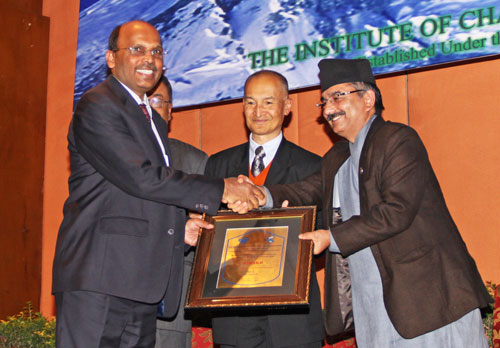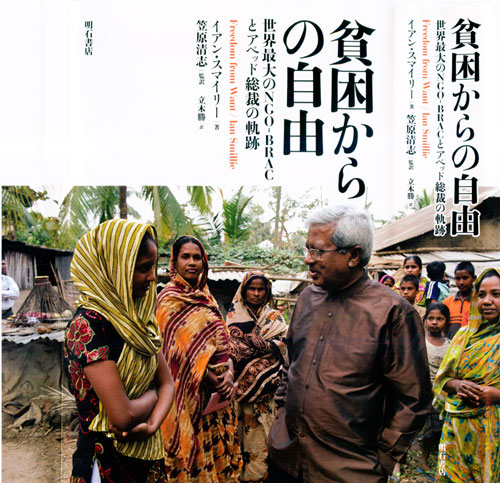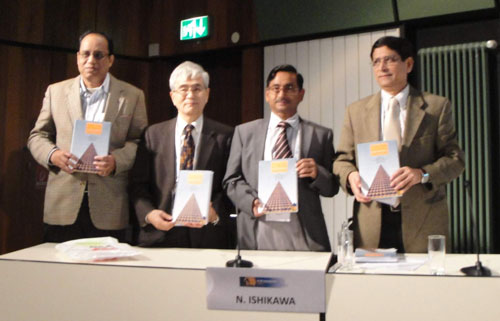
News (826)
Space technology can help BRAC
19 December 2010, Dhaka. An article titled “Deltas in Space: The Space Technology Comes Down to Earth” by Michael Van Der Mark came out in the Dutch Magazine called ‘Deltas in Times of Climate Change’. The article talks about space technology and water management technology and how cooperation between the two sectors can result in many benefits. Space technology predictions can help predict weather and its benefits can even reach everyday farmers with water availability forecasts. The article says organisations such as BRAC can reap benefits from space technology by better understanding variations of weather through reliable and advanced predictions will mean less loss of lives and crops. The following are a few extracts from the article:
One of the organizations that could benefit from the developments is BRAC, a large organization working to alleviate poverty in Bangladesh and nine other countries in South Asia, Africa and Haiti. Based in Dhaka, Bangladesh, BRAC not only provides access to financial services but also to health, education, water and sanitation services. Dr Babar Kabir, BRAC’s Director for Water and for Disaster, Environment and Climate Change, explains that major challenges remain: “We need to ensure food security and reduce vulnerability to natural disasters. It is here that science (from satellite data downwards) can play a significant role, by providing early warnings and help us to better understand weather variability resulting from climate change.” Optimizing the hydrological data supply chain is important, says Dr Kabir, as it would link science to grassroots development: “Researchers have limited themselves to linking to academic institutions. They have ignored the strength of the NGOs and others who work for the development of the common people.” BRAC’s work focuses on the poor, especially women and children, and better understanding of variations in the weather through reliable and advanced predictions will mean less loss of lives and crops.
In the end it will be organizations like BRAC that will be able to issue better seasonal forecasts for local rice farmers, so that the premium on crop insurance can be reduced from four to three percent – a net gain of 25 percent!” Dr Kabir agrees. “Yes, definitely. Farmers, fishermen, small-scale private entrepreneurs – all will benefit. Given that the initial focus will be on weather forecasting and event predictions, the reliability of the data will be critical, whether it is to understand that a disaster is approaching or to provide very specific rainfall prediction. Tracking of the monsoon landfall is very important for agricultural activities in Bangladesh, as many crops are rain fed. Accurate rainfall prediction, when and how much, will help farmers to increase productivity. Once disaster prediction has been perfected, farmers can then be encouraged to engage in crop insurance.” Reliable data will mean that BRAC would be able to save on insurance premiums, enabling them to purchase data from the streamlined process. Nevertheless, Dr Kabir adds, “While BRAC is trying to develop its own expertise to understand the scientific data, it does not wish to duplicate efforts or expertise that already exists elsewhere. We need to find an easy way of coordinating both between and within the scientific community. We need data analysis based on client needs, and reports that are in non-scientific language.”
To read the full article please download :
http://www.changemagazine.nl/doc/deltatimes/deltas-in-space.pdf
BRAC opens its limb and brace center in Haiti
17 September 2010, Dhaka. This week, BRAC was finally able to open its limb and brace center and began serving patients in Haiti.
One of our Limb and Brace Center staff fits a
young girl for a prosthetic leg.
We had 10 patients come to the Center on the first day, as well as a few other guest and supporters, including the Haitian Secretary of State for the Inclusion of Persons with disabilities, Dr. Michel Pean. Here are some pictures from opening day:
|
Our staff from the Limb and Brace Center in Bangladesh
|
|
The Limb and Brace Center workshop, where artificial limbs and
|
|
Dr. Ripon, the head of BRAC's Limb and Brace Center, with |
BRAC Hosts Seminar on “Public Private Participation in Safe Migration Management”
12 December 2010, Dhaka. With a vow to instigate public private participation in Safe Migration Management as well as creating a good rapport with recruiting agencies for pro-migration services, BRAC Advocacy Unit’s Safe Migration Facilitation Centre (SMFC) and The National Alliance of Migrant’s Rights, Bangladesh (NAMR’B) jointly organised a seminar on “Public Private Participation in Safe Migration Management” with the support of Manusher Jonno Foundation (MJF) at the Auditorium of BRAC Centre today. Currently SMFC is acting as the secretariat of NAMR'B on national level lobbying, advocating and creating pressure for pro-migrant issues. To keep NAMR’B moving ahead with national migration issues was another agenda for organising this seminar which was divided into three sessions with different key presenters, chairs and panel discussants.
The first session was represented by the civil society, the second by the recruiting agencies and the final session was facilitated by the representatives from Bangladesh Government. SK. Mojibul Huq, Manager, BRAC Advocacy Unit was the moderator of the seminar.
Dr. Uttam Kumar Das, Deputy Director of South Asian Institute of Advanced Legal and Human Rights Studies (SAILS) presented the keynote paper of the first session titled “Safe Migration and Bangladesh: Potentials, Possibilities and Problems”. The keynote paper of the second session was prepared by Mr. Ali Haider Chowdhuri, Secratery General, Bangladesh Association of International Recruiting Agency (BAIRA) and was presented by Radyan Rahave from BRAC Advocacy Unit titled “Migration & Economic Development: Declaration as Thrust Sector in Bangladesh”. In the final session, Mr. Kafayet Ullah, Deputy Secretary to Bangladesh Government presented the key note titled “Managing Safe Migration: Public Private Cooperation”.
All the three sessions were followed by open floor discussions where all the participants expressed their thoughts and views on the respective topics. From their argument some very valid and important recommendations came out which would contribute to facilitate very effective and efficient public private participation in Safe Migration Management.
Mr. Anisul Islam Mahmud, Honourable Member of Parliament and Chair to Parliamentary Standing Committee of Ministry of Expatriate Welfare and Overseas Employment, was present as the Chief Guest in the seminar. Dr. Jafar Ahmed Khan, Honourable Secretary to Ministry of Expatriate Welfare and Overseas Employment (MEWOE) inaugurated the seminar. Dr. Mahabub Hossain, Executive Director of BRAC welcomed all the participants from the Government, recruiting agencies and NGOs in the seminar.
BRAC wins award for Transparent Financial Reporting
12 December 2010, Kathmandu. BRAC was awarded the South Asian Federation of Accountants (SAFA) 2009 award in the category of Non Governmental Organisations for the Best Presented Accounts and Corporate Governance Disclosures.

Mr. S.N. Kairy, Director Finance & Accounts, received the award on behalf of BRAC at a ceremony held on Sunday, December 12, 2010 at the Hotel Soaltee Crowne Plaza in Kathmandu, Nepal. Mr. Surendra Pandey, Honourable Minister for Finance, Government of Nepal was the chief guest of the event. BRAC previously received the SAFA Award for the years 2005, 2006, 2007 and 2008.
SAFA is a forum of professional accountancy bodies committed to developing the accountancy profession in the South Asian region. The Best Presented Accounts awards are conferred on the basis of evaluation administered by SAFA's Committee for improvement in transparency, accountability and governance of published annual reports of entities from South Asian countries.
BRAC Hosts Seminar on “Public Private Participation in Safe Migration Management”
12 December 2010, Dhaka. With a vow to instigate public private participation in Safe Migration Management as well as creating a good rapport with recruiting agencies for pro-migration services, BRAC Advocacy Unit’s Safe Migration Facilitation Centre (SMFC) and The National Alliance of Migrant’s Rights, Bangladesh (NAMR’B) jointly organised a seminar on “Public Private Participation in Safe Migration Management” with the support of Manusher Jonno Foundation (MJF) at the Auditorium of BRAC Centre today. Currently SMFC is acting as the secretariat of NAMR'B on national level lobbying, advocating and creating pressure for pro-migrant issues. To keep NAMR’B moving ahead with national migration issues was another agenda for organising this seminar which was divided into three sessions with different key presenters, chairs and panel discussants.
The first session was represented by the civil society, the second by the recruiting agencies and the final session was facilitated by the representatives from Bangladesh Government. SK. Mojibul Huq, Manager, BRAC Advocacy Unit was the moderator of the seminar.
Dr. Uttam Kumar Das, Deputy Director of South Asian Institute of Advanced Legal and Human Rights Studies (SAILS) presented the keynote paper of the first session titled “Safe Migration and Bangladesh: Potentials, Possibilities and Problems”. The keynote paper of the second session was prepared by Mr. Ali Haider Chowdhuri, Secratery General, Bangladesh Association of International Recruiting Agency (BAIRA) and was presented by Radyan Rahave from BRAC Advocacy Unit titled “Migration & Economic Development: Declaration as Thrust Sector in Bangladesh”. In the final session, Mr. Kafayet Ullah, Deputy Secretary to Bangladesh Government presented the key note titled “Managing Safe Migration: Public Private Cooperation”.
All the three sessions were followed by open floor discussions where all the participants expressed their thoughts and views on the respective topics. From their argument some very valid and important recommendations came out which would contribute to facilitate very effective and efficient public private participation in Safe Migration Management.
Mr. Anisul Islam Mahmud, Honourable Member of Parliament and Chair to Parliamentary Standing Committee of Ministry of Expatriate Welfare and Overseas Employment, was present as the Chief Guest in the seminar. Dr. Jafar Ahmed Khan, Honourable Secretary to Ministry of Expatriate Welfare and Overseas Employment (MEWOE) inaugurated the seminar. Dr. Mahabub Hossain, Executive Director of BRAC welcomed all the participants from the Government, recruiting agencies and NGOs in the seminar.
BRAC wins award for Transparent Financial Reporting
12 December 2010, Kathmandu. BRAC was awarded the South Asian Federation of Accountants (SAFA) 2009 award in the category of Non Governmental Organisations for the Best Presented Accounts and Corporate Governance Disclosures.

Mr. S.N. Kairy, Director Finance & Accounts, received the award on behalf of BRAC at a ceremony held on Sunday, December 12, 2010 at the Hotel Soaltee Crowne Plaza in Kathmandu, Nepal. Mr. Surendra Pandey, Honourable Minister for Finance, Government of Nepal was the chief guest of the event. BRAC previously received the SAFA Award for the years 2005, 2006, 2007 and 2008.
SAFA is a forum of professional accountancy bodies committed to developing the accountancy profession in the South Asian region. The Best Presented Accounts awards are conferred on the basis of evaluation administered by SAFA's Committee for improvement in transparency, accountability and governance of published annual reports of entities from South Asian countries.
Book Release: "From One to Many: Scaling Up Health Programs in Low Income Countries"
09 December 2010, Dhaka. From One to Many: Scaling Up Health Programs in Low Income Countries, published by The University Press Limited was recently launched. The book is an excellent resource for anyone interested in learning about both the problems and the opportunities involved in effectively scaling up health programs.
The book is a collection of articles submitted to the International Conference on Scaling Up Health Programs, held in Dhaka, Bangladesh in December 2008. This edited volume is comprised of 17 chapters, two of which focus specifically on BRAC's efforts and successes in scaling up maternal health programs as well as the rural tuberculosis program.
In the foreword, Founder and Chairperson of BRAC, Sir Fazle Abed, writes, "the problems of poverty and disease are immense, therefore so should be the scale of the solutions." This edited-volume takes a deep look at many of the health care problems faced by the world's poorest, and provides a framework for understanding the challenges and opportunities within the field.
From One to Many: Scaling Up Health Programs in Low Income Countries has been released in Bangladesh, Germany and Switzerland and was edited by:
- Richard A. Cash: Senior Lecturer at the Harvard School of Public Health, Visiting Professor at the James P. Grant School of Public Health at BRAC University; BRAC USA Board Member
- A. Mushtaque R. Chowdhury, Associate Director at the Rockefeller Foundation, Professor at Columbia University in New York
- George B. Smith, Food Systems Expert
- Faruque Ahmed, Director of the BRAC Health Program
BRAC Book "Freedom from Want" by Ian Smillie is now available in Japanese Version

06 December 2010, Dhaka. A Japanese translation of the book ‘Freedom From Want’ has been published by Kumarian Press, Sterling, Virginia through Tuttle-Mori Agency Inc., Tokyo. The original English edition was written by Ian Smillie and was published in 2009. Freedom From Want traces BRAC’s evolution from a small relief operation indistinguishable from hundreds of others, into what is undoubtedly the largest and most variegated social experiment in the developing world. BRAC’s story shows how social enterprise can trump corruption and how purpose, innovation and clear thinking can overcome the most entrenched injustices that society can offer.
BRAC Book "Freedom from Want" by Ian Smillie is now available in Japanese Version

06 December 2010, Dhaka. A Japanese translation of the book ‘Freedom From Want’ has been published by Kumarian Press, Sterling, Virginia through Tuttle-Mori Agency Inc., Tokyo. The original English edition was written by Ian Smillie and was published in 2009. Freedom From Want traces BRAC’s evolution from a small relief operation indistinguishable from hundreds of others, into what is undoubtedly the largest and most variegated social experiment in the developing world. BRAC’s story shows how social enterprise can trump corruption and how purpose, innovation and clear thinking can overcome the most entrenched injustices that society can offer.
Book on Scaling up Health Programmes launched
29 November 2010, Dhaka. A new book titled “From One to Many: Scaling Up Health Programs in Low Income Countries” was recently launched in Germany and Switzerland. Published by University Press Limited of Dhaka, the book has 17 chapters, including 4 on Bangladesh.
This edited volume is a collection of articles by eminent researchers and practitioners from around the world that were submitted to the International Conference on Scaling Up Health Programs that was held in Dhaka, Bangladesh in December 2008.
In Germany, the book was launched in Berlin during the 41st International Union against Tuberculosis and Lung Disease (IUATLD) World Conference on Lung Health (11 – 15 November, 2010). It was formally launched by Dr. Nobukatsu Ishikawa, the Director of the Research Institute of Tuberculosis (RIT), Japan.
 Jalaluddin Ahmed (Asso. Director, BRAC Health Programme), and Dr. Nobukatsu Ishikawa, the Director of the Research Institute of Tuberculosis (RIT), Japan, AKM Amir Hossain (Additional Secretary, MoHFW, GoB), Faruque Ahmed (Director, BRAC Health Programme) - at the launch of the book
Jalaluddin Ahmed (Asso. Director, BRAC Health Programme), and Dr. Nobukatsu Ishikawa, the Director of the Research Institute of Tuberculosis (RIT), Japan, AKM Amir Hossain (Additional Secretary, MoHFW, GoB), Faruque Ahmed (Director, BRAC Health Programme) - at the launch of the book
While in Switzerland, it was launched in Montreux during a conference on health system research (16 – 19 November, 2010) organised by World Health Organization (WHO). Dr Judith Rodin, the President of the Rockefeller Foundation, who was the chief guest on the occasion, formally launched the book. Three of the editors of the book Faruque Ahmed (Director, BRAC Health Programme), Richard Cash (Senior Lecturer at the Harvard School of Public Health and Visiting Professor at BRAC University) and Dr. A. Mushtaque R. Chowdhury (Associate Director of the Rockefeller Foundation and Professor at Columbia University) were also present at the launching.
Join the world’s biggest family




